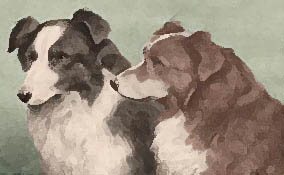

![]()
THE ORIGIN OF THE WORD "COLLIE"
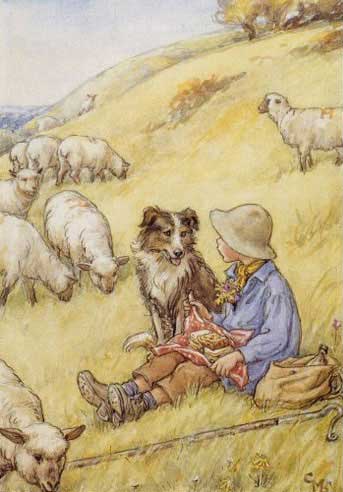
Above, an illustration from Simon The Swan
by Cicely Mary Barker
It appears to be one of the great mysteries of the collie breeds, but where did the word "collie" come from?
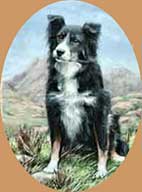 Left, a collie from a 19th century painting, artist unknown.
Left, a collie from a 19th century painting, artist unknown.
In her book, Herding Dogs, Their Origins and Development in Britain (Faber & Faber, 1987), Iris Combe says "'Collie' is a Gaelic word meaning useful." However, Mackenzie, in his English-Gaelic Dictionary (Gairm Publications, Glasgow, 1975) gives these words as definitions of the word "useful" (the translation, in parentheses, from Gaelic to English comes from Dwelly, The Illustrated Gaelic-English Dictionary, Gairm Publications, 1901-1911): feumail (necessary/useful), iomchuidh (convenient/necessary), freagarrach (suitable), stamhor (useful), tarbhach (beneficial), and math (good/useful). These words do not bear any resemblance to the word "collie". (Combe was speaking of Irish Gaelic, which is usually called "Irish", as opposed to Scottish Gaelic, which is usually just called "Gaelic". There are differences in the two languages, but both derive from the same Celtic strain and have many words in common.)
Combe goes on the say that "some say that the collie, or colley in its [early] English spelling, got it's name from the breed of sheep it herded." She posits that the black-faced sheep may have been called "coaley" for black. This idea is also promoted by the often quoted reference in Chaucer's Nonnes Tale "Ran Colle our dogge...", the implication being that he was a black dog, and that's why his name was Colle (like "Blackie").
Merriam-Webster online dictionary seems to agree with Combe. Their entries for "colly" and "collie" seem to support the idea of a coal-black origin:
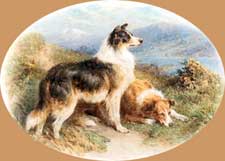 Right, Basil Bradley (1842-1904), "Scotch Collies",
Right, Basil Bradley (1842-1904), "Scotch Collies",
shows two collies of the type that developed into show collies.
Main Entry: colly
Function: transitive verb
Inflected Form(s): collied; collying
Etymology: alteration of Middle English colwen, from Old English colgian, from Old English col (coal)
Date: 1590
Definition: (Dialect chiefly British) to blacken with or as if with soot
and
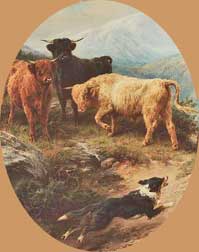 Right, detail from another Bradley, "A Highland Incident".
Right, detail from another Bradley, "A Highland Incident".
Main Entry: collie
Function: noun
Etymology: probably from English dialect colly (black)
Date: circa 1651
Definition: any of a breed of large dogs developed in Scotland that occur in rough-coated and smooth-coated varieties and have erect ears and a long muzzle
In Shakespeare's A Midsummer Night's Dream, Lysander says "Brief as the lightning in the collied night," further advancing this origin for the word collie.
Salopia Antiqua (or An Enquiry From Personal Survey Into the Druidical, Military, and Other Early Remains in Shropshire and the North Welsh Borders with Observations Upon the Names of Places and A Glossary of Words Used in the County of Salop) by the Rev. Charles Henry Hartshorne (John W. Parker, London, 1841), also supports this root for the word collie in the section on "A Glossary of Words Used in Shropshire":
Coller, Colly. s. the black incrustation of smoke and soot which adheres to the outside of a pot or kettle. A[nglo] Sax[on], col; Swed[ish], Germ[an], kol; Dan[ish], kul; Teut[onic], kole.
Colly. v. to dirty, to smut. Ex[amples] "collied his face all o'er"; "passion having my best judgement collied" (Shakespeare, Othello, ii. 3.).
A Dictionary of English Etymology by Hensleigh Wedgwood (Third Edition, 1878 by Macmillan & Co., New York), gives a different and more interesting derivation of the word:
Colly. A shepherd's dog, from having its tail cropped. Sw[edish], kullug, lollig, without horns [or] wanting some member that ought to be there. Sc[ots], to coll, to poll [a polled sheep, for example, means one without horns]. In Hesse, a shepherd's dog is often called Mutz, from muta, a stump; kullmutz, kullarsch, a tailless hen.
However, in Jamieson's Etymological Dictionary of the Scottish Language (Alexander Gardner, Paisley, 1889), another definition is put forth that seems to make more sense, and also proves that Combe was not so far off the mark in wanting to attribute the word "collie" to the Gaelic:
COLLIE, COLLEY. s. 1. The vulgar [meaning "common"] name for the shepherd's dog...Gael. culean, a grown whelp, has for its vocative culyie, which is the term used when one calls to a whelp. [In Gaelic] Coo or cu signifies a dog.
Just to carry this a bit further, Dwelly (considered by some to be the Gaelic-English dictionary) gives the definition of cuilean (a slightly different spelling from Jamieson, the vocative being a chuilein!) as "1. Whelp. 2. Puppy...5. Frequently used for a dog of full growth or any age. "
To me, this is fairly conclusive. If you should come across any other explanation to where the word "collie" comes from, please contact me (carole@woolgather.org).
THE OTHER WEB PAGES WE MAINTAIN
These web pages are copyright ©2013
and maintained by webmeistress Carole Presberg
with technical help from webwizard David Presberg
ALL RIGHTS RESERVED
If you are interested in using ANY material on this website, you MUST first ask for permission.